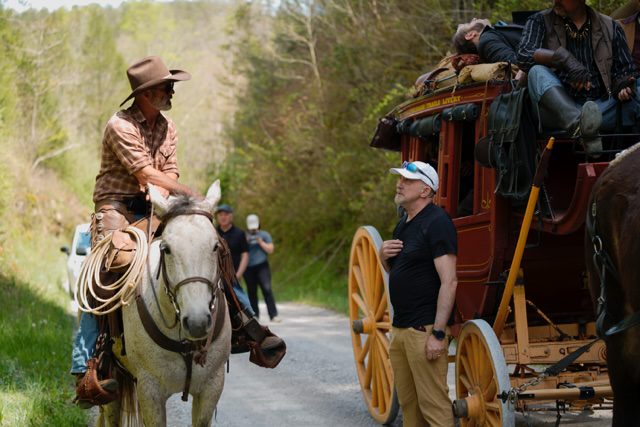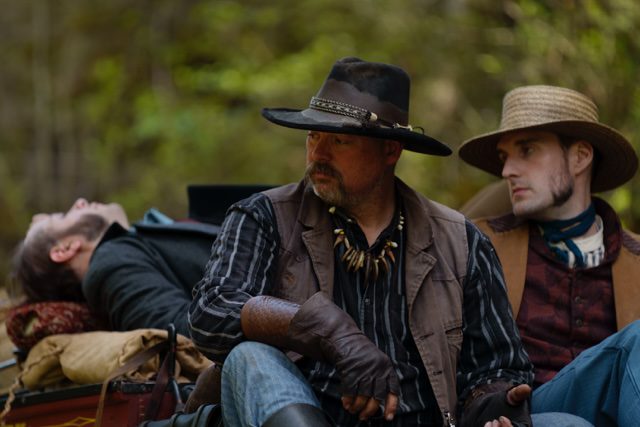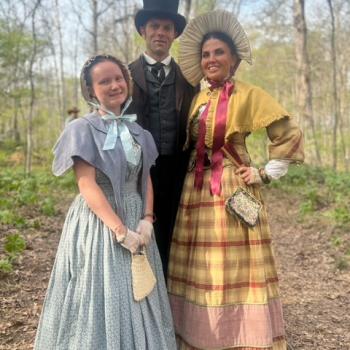
On Thursday night, in company with our core group of filmmakers and two of their wives, my wife and I were able to see a complete version of the forthcoming Interpreter Foundation theatrical film, Six Days in August. There is still post-production work to be done, of course. But there were several scenes in the movie that really moved me. More than once, I felt a profoundly un-Scandinavian tear running down my cheek. Fortunately, the lights were off.

While trying to organize some of the books in my library — hint: at least portions of that library occupy every room in my house, with no exceptions; I always comfort my wife by pointing out that my addiction could have been cocaine — I picked up my copy of Clarence Jordan’s Cotton Patch Gospel: The Complete Collection (Macon, GA: Smyth and Helwys, 2012).
I really admire Clarence Jordan (1912-1969) and his “Cotton Patch” translations. He was an American farmer and, as it happens, a doctorate-holding scholar of New Testament Greek. He was also a very serious Christian and the founder of Koinonia Farm, an interracial religious and agricultural community in southwestern Georgia, as well as one of the founders of Habitat for Humanity. And, yes, there is a connection to former Georgia governor Jimmy Carter, who is also a devoutly serious Christian: Clarence Jordan’s second cousin, the late Hamilton Jordan, served as White House Chief of Staff during the Carter presidential administration and President Carter wrote the introduction to my edition of Clarence Jordan’s Cotton Patch Gospel.
(Incidentally, lest all of these references to Jimmy Carter and his circle lead to political attacks on me, I note for the record that I voted against Jimmy Carter in both of his presidential elections.)
I thoroughly enjoy Clarence Jordan’s translations, which are not merely linguistic renderings — the front matter of my book indicates that Dr. Jordan used the twenty-third edition of the standard Nestle-Aland Greek New Testament as the basis for his work — but cultural translations. What does that mean? He sought to update the materials to make them directly relevant to the audience for which he was translating, which was the Georgia and the American South of the 1950s and 1960s. You will see what I mean as you read his version of Luke 10:25-37, which he sets in his own native state. (The Albany that is mentioned is not the capital of the State of New York but, rather, a county seat in southwest Georgia.) I think that, despite his changes, you’ll recognize the story immediately:
One day a teacher of an adult Bible class got up and tested him with this question: “Doctor, what does one do to be saved?”
Jesus replied, “What does the Bible say? How do you interpret it?”
The teacher answered, “Love the Lord your God with all your heart and with all your soul and with all your physical strength and with all your mind; and love your neighbor as yourself.”
“That is correct,” answered Jesus. “Make a habit of this and you’ll be saved.”
But the Sunday school teacher, trying to save face, asked, “But … er … but … just who is my neighbor?”
Then Jesus laid into him and said, “A man was going from Atlanta to Albany and some gangsters held him up. When they had robbed him of his wallet and brand-new suit, they beat him up and drove off in his car, leaving him unconscious on the shoulder of the highway.
“Now it just so happened that a white preacher was going down that same highway. When he saw the fellow, he stepped on the gas and went scooting by.
“Shortly afterwards a white Gospel song leader came down the road, and when he saw what had happened, he too stepped on the gas.
“Then a black man traveling that way came upon the fellow, and what he saw moved him to tears. He stopped and bound up his wounds as best he could, drew some water from his water-jug to wipe away the blood and then laid him on the back seat.
He drove on into Albany and took him to the hospital and said to the nurse, ‘You all take good care of this white man I found on the highway. Here’s the only two dollars I got, but you all keep account of what he owes, and if he can’t pay it, I’ll settle up with you when I make a pay-day.’
“Now if you had been the man held up by the gangsters, which of these three—the white preacher, the white song leader, or the black man—would you consider to have been your neighbor?”
The teacher of the adult Bible class said, “Why, of course, the nig—I mean, er … well, er … the one who treated me kindly.”
Jesus said, “Well, then, you get going and start living like that!”
You can easily imagine, I think, that this fresh paraphrastic translation of the familiar parable of the Good Samaritan might have hit its Southern audience in the Civil Rights era a little differently than the King James Version would have. At least, I certainly hope so. And it rather dramatically represents something that we all ought to be doing, in our own way. Scripture should comfort us, yes. But it should also interrogate and challenge us.
Ambrose Bierce’s wonderful Devil’s Dictionary offers this definition:
Christian, n. One who believes that the New Testament is a divinely inspired book admirably suited to the spiritual needs of his neighbor. One who follows the teachings of Christ in so far as they are not inconsistent with a life of sin.
So, while Clarence Jordan’s updating of the familiar parable is aimed squarely at the segregationist white Christians of Georgia and the South in the fifties and sixties, we would commit a very serious error if we were to simply let it stop there, reasoning in self-satisfaction that, well, they really deserved it.
The question that the disciples asked at the Last Supper when the Savior prophesied that one of them would betray him — “Lord, is it I?” — is a question that each of us, too, should ask of ourselves. (See President Dieter F. Uchtdorf’s October 2014 conference remarks on precisely this topic.)
“I did liken all scriptures unto us,” wrote the Book of Mormon prophet Nephi in much the same spirit, “that it might be for our profit and learning” (1 Nephi 19:23).













